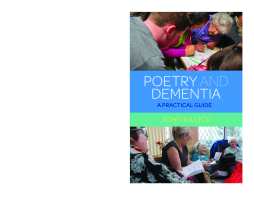
Additional Information
Book Details
Abstract
Poetry is an engaging and inclusive activity for older people that can help develop memory, imagination and identity. This book provides guidance on setting up and monitoring poetry projects for people living with dementia in group care homes and individual families. It explains the benefits of creative expression for people with dementia, and shows how to facilitate poetry reading and writing groups in different environments.
Specific techniques for introducing poetry to older people can be employed by family members or professional care staff to enhance the wellbeing of the individual living with dementia. The ethical issues of running poetry projects in dementia care are explored along with examples of poetry produced by individuals and groups, interviews with care workers, and case studies.
John Killick has been the Writer in Residence and Poet Mentor on several Poetry and Dementia projects over the last 25 years. He currently runs a residential Poetry and Dementia course in Wales.
Described as a practical guide, it is easy to read and yet conveys the complexity of the effects of the condition dementia and ways of using poetry effectively. His understanding and experience of the work gives authority to his explanation and I found it easy to grasp. [...] I felt that Killick summed up what is now the fundament of my practice when working with people of dementia, 'Acts of kindness are what people with dementia need'
Clare Scott, Chair, Lapidus International
Lapidus Quarterly
In this wonderful distillation of long experience John Killick shows us the potential of poetry both as a way of stimulating discussion, and of enabling people with dementia to have a voice. Using his own work and that of colleagues, he provides careful guidance which will be invaluable.
Professor Mary Marshall, Senior Consultant, HammondCare
In this eminently accessible book, John generously and honestly offers a wealth of advice, guidance and resources that emanate from a lifetime of work in using poetry to hear the voices of people with dementia and to capture their lived experience. John carefully explains the craft of using poetry as a medium for positive person-centred work and in doing so makes this book compulsory reading for anyone involved or interested in poetry and dementia.
Maria Pasiecznik Parsons, Chief Executive, Creative Dementia Arts Network
In his book John shows how by being a skilled listener you can capture what seems to be garbled, mixed-up thinking and using literature knowledge, turn it into a work of art, and present this gift back to the person with dementia in the form of their own personal poem. I felt humbled by this work.
Agnes Houston MBE
John Killick's work over many years has shown how poetry, through many and varied means, can contribute massively to well-being for people living with dementia. This wise, clear guidance, with choice examples of poems and illuminating accounts, is sure to encourage and help others develop their skills in this rewarding area.
Sue Benson, Managing Editor, Journal of Dementia Care
Table of Contents
| Section Title | Page | Action | Price |
|---|---|---|---|
| Poetry and Dementia: A Practical Guide by John Killick | 3 | ||
| Chapter One: Introduction | 9 | ||
| Why Poetry? | 9 | ||
| Chapter Two: Reading Poetry | 13 | ||
| Choosing Poems | 13 | ||
| Constructing a Programme | 25 | ||
| Participation Poems | 27 | ||
| Chapter Three: Writing Poetry | 33 | ||
| Groupwork and One-to-Ones | 33 | ||
| How to Run a Group | 35 | ||
| Examples of Group Poems | 37 | ||
| Why Do One-to-Ones? | 51 | ||
| How to Do One-to-Ones | 58 | ||
| The Art of Listening | 59 | ||
| The Art of Transcribing | 60 | ||
| The Art of Editing | 61 | ||
| Ways of Sharing | 72 | ||
| The Present Moment | 74 | ||
| Portraits | 78 | ||
| Chapter Four: Issues Arising | 103 | ||
| Ownership | 103 | ||
| Truth-Telling | 105 | ||
| Aims and Objects | 106 | ||
| Therapeutic Approaches | 108 | ||
| Support for the Poet | 114 | ||
| Evaluation | 116 | ||
| Chapter Five: Postscript | 125 | ||
| Naturalism and Vernacular Eloquence | 125 | ||
| Resources | 131 | ||
| Recommendations and References | 131 | ||
| Books and Articles | 140 | ||
| Organisations and Websites | 143 | ||
| Blank Page |
